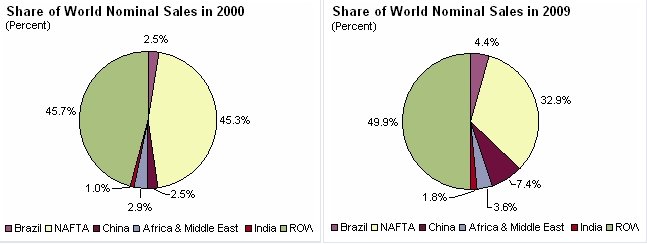The telecommunications industry, especially in developing economies, will continue to grow strong despite the current recession, as new technology enables rural regions lacking infrastructure to finally be able to receive service.
The fall in house prices, sparking the financial crisis, tanking consumer confidence, rising unemployment, and scarce credit have sent the U.S. economy into a downward spiral. Western Europe and other mature economies that were more exposed to the U.S. financial crisis are finding themselves in troubled waters as well. Now, as global demand slows, maturing economies are also moving onto shaky ground. Manufacturing is taking a hit world wide and the outlook is not good. Telecommunications services in both developed and developing economies, although not completely immune to the crisis, will weather out the economic storm gracefully, especially in developing economies, as the industry exhibits a lower degree of cyclicality.
Much of the strong growth in the industry is currently being seen in maturing economies and/or regions, especially Brazil, China, India, and Africa. Rising personal incomes in China, coupled with increasing competition will drive strong uptake. This will give lower income persons, mostly but not necessarily in rural regions, the opportunity to obtain service.
Sales in India will remain strong, despite these turbulent times. Indian telecommunications will also see growth opportunities presented in lower income regions, as the mobile market for high-income regions is more saturated, leaving less room for growth. To preserve strong growth, both China and India need to focus on rural, lower income regions.
The Brazilian population is quickly growing. Strong demand, especially for the Internet is stemming from both the lower end and the higher end markets. This should put pressure on the broadband market to grow rapidly. As the Brazilian economy and business activities continue to grow, demand for mobile services will also continue to grow. Many Brazilian operators have acquired licenses for GSM technology and have upgraded their existing networks to this standard. These operators are now able to capture demand in high-end and corporate markets.
Africa has been an ideal location for investment, as original, outdated infrastructure installed in developed economies hardly existed. This has prevented and continues to prevent many from obtaining fixed line access. New developments in technology, such as WiMAX, have allowed telecommunications providers to reach so many who were unable to receive services before. Demand for communications services is thriving in Africa and telecommunications services, especially wireless services, have become more necessary over the years, as businesses and consumers have begun to heavily rely on them. The result is a fast growing sector with strong opportunities for investment.

Compared to manufacturing, telecommunications services are doing well. Mature economies, especially the United States should see sales growth slow down, as the financial industry cuts costs and the market is already very saturated. Despite this, sales will continue to grow, as new technology allows unwired and exchange-distant areas to now receive service.
A trend developing in the industry is that growth is moving away from fixed line service and into wireless services. This is due to many factors, such as the convenience it offers and accessibility it provides to rural areas, especially in developing countries. As a result, we should continue to see growth be more concentrated in this sector of the industry.